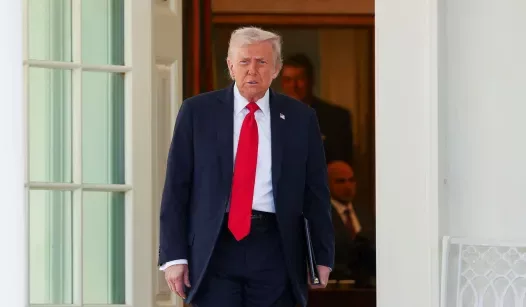In recent years, the political landscape in the United States has been marked by intense debates and polarized opinions, particularly regarding the actions and policies of former President Donald Trump. While some critics argue that Trump is undermining the integrity of the White House, it’s essential to take a step back and analyze the situation with a more nuanced perspective.
First and foremost, it’s important to understand that the presidency is a powerful position, and each occupant brings their unique style and approach to governance. Trump’s tenure was characterized by a break from traditional norms, which has led to widespread discussions about the implications of his actions on the presidency and the White House itself.
One of the most significant aspects of Trump’s presidency was his approach to communication. Utilizing social media, particularly Twitter, Trump bypassed traditional media channels, directly addressing the public and shaping narratives in real-time. This strategy allowed him to connect with a base that felt alienated by conventional political discourse. While this method was effective in rallying support, it also contributed to a divisive political climate, with many feeling that the White House was becoming a platform for personal grievances rather than a bastion of national unity.
Moreover, Trump’s policies often sparked heated debates. From immigration reform to trade agreements, his administration took bold stances that polarized the electorate. Supporters lauded his efforts to prioritize American interests, while opponents argued that his policies were detrimental to social cohesion and international relations. This dichotomy illustrates the complexity of evaluating a president’s impact; what some see as a necessary disruption, others view as a threat to democratic values.
Additionally, the management of the White House itself underwent notable changes during Trump’s administration. The appointment of various officials, often with little prior governmental experience, raised questions about the effectiveness and stability of his administration. Critics pointed to high turnover rates and controversial appointments as signs of disarray. However, supporters argued that this approach was indicative of a willingness to challenge the status quo and bring in fresh perspectives.
It’s also crucial to consider the broader context of Trump’s presidency within American history. Every president faces challenges and criticisms, and Trump is no exception. His administration’s actions must be viewed through the lens of historical precedents. For instance, previous presidents have also faced accusations of undermining the office, yet the institution of the presidency has remained intact. The resilience of American political institutions suggests that, while Trump’s actions may have been contentious, they did not fundamentally dismantle the White House.
Another important factor to consider is the role of the electorate. Trump’s presidency was marked by significant voter engagement, with many Americans becoming more politically active than ever before. This surge in political participation can be seen as a positive outcome, fostering a more informed and engaged citizenry. The rise of grassroots movements, both in support of and in opposition to Trump, highlights a renewed interest in politics among the populace.
As we reflect on Trump’s time in office, it is essential to recognize that the White House is not merely a physical structure but a symbol of American democracy. While Trump’s presidency may have challenged certain norms and sparked controversy, the institution itself remains resilient. The ongoing debates about his legacy will undoubtedly shape future political discourse, but it is crucial to approach these discussions with a balanced perspective.
In conclusion, while it may be tempting to view Trump as a figure who is “destroying” the White House, a more nuanced examination reveals a complex interplay of actions and reactions that have defined his presidency. The impact of his administration will continue to be felt in American politics for years to come, serving as a reminder of the dynamic nature of governance and the importance of active civic engagement. As citizens, it is our responsibility to remain informed and engaged, ensuring that the principles of democracy endure regardless of the occupants of the White House.
